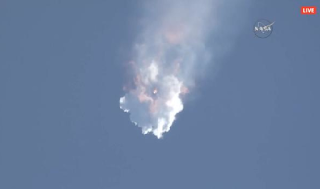There's a lot going on right now in the realm of space exploration. The Dawn mission to Ceres is getting very interesting, the New Horizons mission will reach Pluto and Charon in two weeks; this is all huge, and I haven't posted anything here at all about any of it for a couple of months, due mostly to simple writer's block. Sad about that, and hoping to do better.
So, this morning the SpaceX CRS-7 Dragon/Falcon 9 cargo mission to the International Space Station failed. Notably it was the third failure of a cargo vessel to the ISS in the past eight months, after the Orbital ATK Antares back in October and the Russian Progress 59 in April. In the scheme of such things, this really is not a big deal. The ISS crew have enough provisions until October, and there's another Progress flight scheduled for this Friday. Nobody was hurt, and out of nineteen total Falcon 9 launches since 2010, one catastrophic failure is right at the 5% failure rate which is the rough median for orbital launches.
So, why does this feel like such a monumental blow to the commercial space program, and to spaceflight in general? Rockets explode, it's one of the things they do. When the Antares exploded, spectacularly, last fall, it made the news of course, and people speculated about whether or not Orbital would survive. But nobody speculated about whether or not spaceflight itself would survive. That would have been crazy. But today I've seen that speculation in the media, in chat rooms and other online forums, in all kinds of places that are populated by people who actually understand spaceflight. In the NASA press briefing this morning you could feel that current as well, even though they did a very good job of presenting the rational analysis of this being just another rocket explosion. You could even see it in Charlie Bolden's demeanor this morning. I felt it too.
The difference is not in the scope or magnitude of the loss of the Falcon 9 rocket. We lose rockets. The difference is that this is SpaceX.
For several years now there has grown an idea that the brilliant Elon Musk was doing what no other entity had ever been able to do before. That the founder of Pay Pal was somehow smarter than all of the engineers at NASA, Roscosmos, ESA, Boeing or Lockheed, and had figured out how to make spaceflight safe and affordable when all of the others had failed. With each successful Falcon 9 flight this became easier to believe, largely because we really wanted to believe it. Even Musk's competitors watched him to see if they could emulate his success.
Underlying this was sometimes a sense that SpaceX didn't know what they didn't know, and that through trial and error they would eventually come to look more like Boeing, Lockheed and other "old space" companies. But, we wanted this to not be true. We wanted spaceflight to be as easy, safe and affordable as Musk believed it to be.
Today we learned that Tsiolkovsky doesn't play favorites. And in many ways, today SpaceX finally became a real, grown-up rocket company. And we who follow spaceflight have had to grow up a bit as well.
Ad astra.
